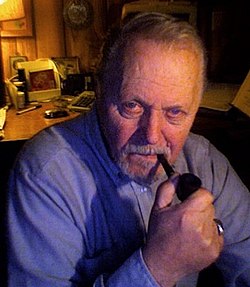Reception and legacy
Brandlon L. Chase, the president of distributor Group 1 International Distribution Organization, won the "Outstanding Executive Achievement" award at the Academy of Science Fiction, Fantasy and Horror Films. [15] Linda Gross for the Los Angeles Times called it a "poorly done combination of science fiction, Jaws, and Day of the Locust." Gross was also critical of the film's script and Rebane's direction, but thought the spiders to be scary. [16] Glenn Garvin from The Delta Democrat-Times described the movie as "self-subconsciously ludicrous". Garvin also recounted during his theater experience kids at the screening were laughing instead of being scared by the film. [17] Albuquerque Journal 's Chuck Mittlestadt gave the film a warmer reception, giving positive marks for its editing and direction. Mittlestadt also gave praise to Barbara Hale, Kevin Brodie, and Alan Hale's acting. [18]
Michael Weldon, in The Psychotronic Encyclopedia of Film , while criticizing the special effects and comparing them negatively to The Giant Claw , considered the movie to be funny. Leonard Maltin wrote, "Veteran cast can't do much for this tacky horror opus filmed in Wisconsin."VideoHound's Golden Movie Retriever gave the film one star, while Robert Firsching from Allmovie gave the movie one star out of five, speaking negatively about Rebane's direction and the movie's use of humor. [22] Blockbuster Entertainment gave the film one star and thought that the unintentional laughs from the film wore thin quickly. The film is listed on 'The 100 Most Enjoyably Bad Movies Ever Made' in the book The Official Razzie Movie Guide by Golden Raspberry Award founder John Wilson. Wired listed the movie as one of the "cheesiest movies" ever made. [25]
On May 31, 1997, The Giant Spider Invasion was featured on the Sci-Fi Channel in a season eight episode of Mystery Science Theater 3000 (MST3K), a comedy television series in which the character Mike Nelson and his two robot friends Crow T. Robot and Tom Servo are forced to watch 'bad films' as part of an ongoing scientific experiment. Regarding the episode, Director Bill Rebane thought it was strange, but overall accepted it due to its popularity. [26] During the episode, while Pearl, Brain Guy, and Bobo are out camping, they inadvertently unleash Body Snatcher aliens that affected Pearl, Brain Guy and all the Bots, until Bobo destroys the aliens to bring the ones affected back and turn them back to normal. This caused Pearl to force the SOL crew to watch the movie again, much to their horror.
In 2006, Rhino Entertainment released the MST3K episode as part of the "Volume 10" DVD collection of the series, along with Godzilla vs. Megalon , Swamp Diamonds , and Teen-Age Strangler . [27] The boxset was later recalled due to the rights to Godzilla vs. Megalon being disputed. It was redistributed in the "Volume 10.2" collection in 2008, with Godzilla vs. Megalon being replaced by The Giant Gila Monster . [28] On August 15, 2019, The Giant Spider Invasion was featured as a Rifftrax live show. [29]
Bill Rebane had a festival given in his honor; the "Bill Rebane Film Festival" took place in Madison, Wisconsin in May 2005. Hosting the festival were MST3K stars Michael J. Nelson and Kevin Murphy, the voice of Tom Servo. [26] In an article recapping the festival in Scary Monsters Magazine, the two noted that although they lambasted the film during their show, they admired how Rebane was able to pull cast and crew together to get the film made. In 2011, it was announced that the movie was going to be remade into a musical. [30]
In a 2012 interview with Wisconsin television station WSAW-TV, Rebane remarked that he was not sure how the movie became popular, saying it was not an initial hit until it became a cult classic. He also stated that while the movie grossed millions of dollars over the past 35 years, he never saw a fraction of the money, calling the film "one of the most pirated movies in history." Despite his grievances, Rebane was proud of the impact that the movie made for the city of Merrill, Wisconsin. [2]
In 2012, film historian Bill Dexter found the shells of the two 30-feet spiders with the intent on restoring the spiders to their original form. [31] In 2013, the shell of one of the main giant spiders was reported stolen by Rebane. Weeks later, a recycling facility announced that the giant spider was brought to them as scrap metal. [32]


